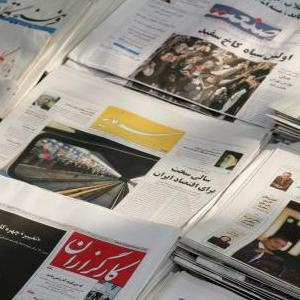Tehran's Daily Newspaper Review

Iran reported the government taking actual steps to enable public servants and workers to purchase on credit the products of 800 factories. According to Abbas Gholizadeh, official in charge of the plan, announced that so far the data for 1.5 million public servants has been delivered to the banks to issue the credit cards. Iran also reported the 30% profit in the Tehran stock exchange market by the end of the year. “The Secret of Imperishability”, the daily’s editorial written by Ali-Akbar Javanfekr, elaborated on the secret of the Islamic Republic’s survival before slamming the forty-day detention of Mohammad-Sharif Malekzadeh, a close companion of Mashaei and a short-lived deputy foreign minister.
Jomhouri-e Eslami’s front page was typical: a report on the Arab Spring, this time Moroccan anti-dictatorship protests, and a criticism by a senior cleric, on this occasion Ayatollah Hashemi Rafsanjani, who warned about the closure of food industries as a result of indiscriminate imports. In its editorial, Jomhouri-ye Eslami warned that the new Egypt is not quite different from the age of Mubarak and Iranian statesmen should stop “begging” for resumption of ties with Egypt before the prerequisites are met.
“Iran exports ballistic missiles”, Kayhan boastfully quoted Gen. Mehdi Farahi, head of the Aerospace Industries Organization. Majles has approved of the plans proposed by four ministerial candidates introduced by the president, Kayhan reported. The editorial of the newspaper analyzed efforts to create a ‘united front’ inside the Principlist camp. According to Mohammad Imani, author of the editorial, presenting a single slate for the upcoming parliamentary elections is the minimal expectation to be met-- the front should eventually function as a permanent headquarters for the camp.
Resalat’s top headline concerned rebates for overdue debts, quoted by Head of Iran's Chamber of Commerce Mohammad Nahavandian. Resalat also covered the “fragile ceasefire” between American doves and hawks. In the meantime, head of state-run broadcaster Ezatollah Zarghami spoke of Iranian drama products dominating the satellite channels.
Shargh wrote of “ambiguities in Iran's oil exports to India”. The newspaper also reported that the Iranian FM Ali-Akbar Salehi is preparing to visit India to end the stalemate over India’s overdue payments to Iran. Speaker of Majles’ Reformist minority bloc, Dariush Ghanbari, claimed over 90 signatories for the first-time questioning of the president in parliament. Shargh’s editorial was written by Kazem Delkhosh, member of the parliament’s economic committee, which warned about the adverse impact of the influx of imported goods in the absence of government regulation.
Central Bank Chairman Mahmoud Bahmani used a mixed tone to speak of developments in the fiscal market: “We will shut down another 100 bureau de changes if necessary, to stop foreign currency exchange”, “we have adequate gold reserves for another 15 years” and “no license for any new banks will be issued”. In an interview with Tehran-e Emrooz, Deputy Mayor for Social Affairs, Hadi Ayyazi-- whose department was criticized after the controversial water gun fight in Tehran that involved the mingling of young boys and girls-- spoke of Islam’s efficiency as an administrative guideline. The newspaper’s editorial was a critique of the Central Bank’s fiscal measures.
Vatan-e Emrooz covered the upper fold of its front page with a picture of Tehran's Azadi Stadium, hailing the launch of the new soccer season in Iran, where controversies heavily override the actual game. It also announced end of the oil dispute between Iran and India, and a gradual move towards nuclear crisis for US and Russia.
* Note: Vatan-e Emrooz does not publish on Thursdays.
Trouble with understanding some terms? Check our Glossary of Iranian Political Terms.
Briefing
Hamshahri (Citizen) is the official daily newspaper of Tehran's Municipality. Its general directions in politics, culture and economy are determined by the mayor of Tehran, currently Mohammad Baqer Qalibaf.
Iran is the official organ of the administration.
Jomhouri-ye Eslami (The Islamic Republic) was known as the official organ of the Party of the Islamic Republic, founded in 1979 and disbanded in 1987. Currently, it is an open critique of Mahmoud Ahmadinejad's policies and is known to be a mouthpiece of Akbar Hashemi Rafsanjani.
Kayhan (Universe) is a hard-line conservative newspaper. Its editor-in-chief –currently Hossein Shari’atmadari- is appointed by Iran's Supreme Leader. Shari’atmadari’s editorials often spark off controversy and debate inside Iranian political circles.
Khabar (News) is a principlist daily newspaper which adopts a critical stance towards Ahmadinejad's policies.
Resalat (Mission) belongs to the moderate wing of the principlist camp. Resalat’s best known analyst is Amir Mohebbian, its political editor.
Shargh (East) is a moderate reformist newspaper. It was the most popular and influential reformist newspaper in its first period of publication which lasted from August 2003 until September 2006.
Tehran-e Emrooz (Tehran Today) is a ‘principlist reformist’ newspaper, connected to Mohammad Baqer Qalibaf.

